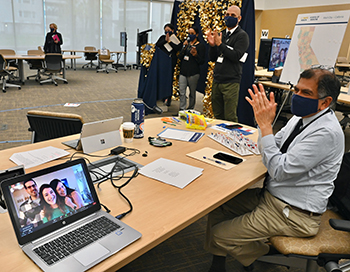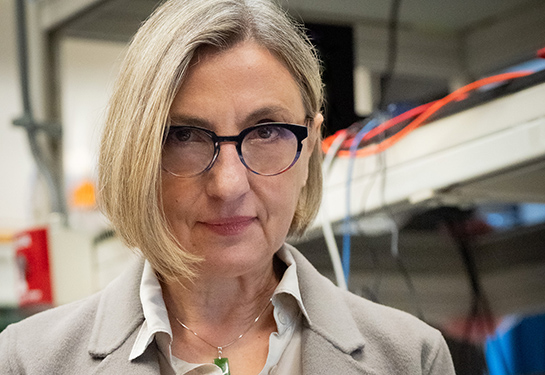Match Day celebrates more than 100 medical students
Vast majority of graduating doctors will train in California, and most of them in primary care
Months of anxiety ended Friday morning for 104 soon-to-graduate medical students.

At exactly 9 a.m., sitting in their homes surrounded by loved ones, members of the UC Davis School of Medicine Class of 2021 refreshed the web page to their academic portals. Within seconds, students learned where they will spend the next three to seven years of their journey to train as specialists.
It was a scene repeated simultaneously across the United States as 38,106 residency positions were offered to graduating medical students, thanks to a complex algorithm that plays matchmaker.
And just like last year, the ongoing pandemic forced medical schools to shun a large, festive ceremony where hundreds would normally attend. In its place, Match Day was celebrated by students and their families in front of a computer screen during a class-wide Zoom session that aired live to everyone else via Facebook.
It was still a cheerful event as students announced their matches.
“So, I matched into pediatrics at Stanford!” said Morgan Conley, sitting in front of a “congrats” sign and surrounded by two supporters.
A wide-smiling Kimberly Ngo waived to her camera and declared, “I’m so happy to say I matched into my No. 1 for family medicine, UCSF!” She broke into applause and thanked her family, friends and mentors.
“I’m obviously crying,” said Christina Lowry, sitting between her partner and her mother. “I’m going to obstetrics-gynecology at Kaiser San Francisco!”
Roxana Cabrera held up the blue “I matched” fill-in-the-blank placard that was sent to students by the School of Medicine, then made her joyous announcement: “I matched at my No. 1, Stanford-O’Connor. So excited!” she said. “I’m surrounded by my lovely parents, who have been with me through everything,” she added, her voice cracking with emotion, “and my future husband, he deserves an honorary medical degree.”
As usual this year, most students matched into training programs in the Golden State, which aligns with the school’s values of preparing doctors to work in California communities where they are most needed, including in urban underserved and rural areas.
An impressive 85% of students will train in California, and 22% will stay at UC Davis, said Sharad Jain, associate dean for students.
The matching process begins in the fall during the final year of medical school when students choose which programs to apply to and can interview with faculty from those institutions. In a normal year, it means taking road trips or building up frequent flier miles, as students often land multiple interviews. This year, however, all match interviews occurred online, even for students at UC Davis interviewing with UC Davis.
Residency program directors, meanwhile, also compile a ranking of their preferred candidates. The National Resident Matching Program then processes everyone’s choices into a computerized mathematical algorithm.
Many students are excited to match in the same area where they were raised.
For Alejandra Beristain-Barajas, who appeared on screen with her husband and their baby Samuel, it means providing medical care at Natividad Medical Center in Salinas. “We’re going back home, to see my parents in Watsonville,” she said.
For Farsam Fraz, on screen with eight cheering supporters and Match Day balloons on the wall, it means training to be an OB-GYN at Stanford University, which is a half hour south of where she grew up in San Mateo County.
Sixty percent of students will specialize in primary care, which is slightly higher than last year’s 59%, and 21% of them will train for internal medicine, including Ryan Pascua who matched at UC San Francisco Zuckerberg San Francisco General Hospital.
Javid Mahmoodi is going to UC Irvine for internal medicine. “I’d just like to thank my family for supporting me through undergrad and medical school and my gap years,” he said, “and my wife for supporting me through medical school, as well.”
Primary care careers are the shortest specialization track, which take three years of residency. Students that matched into neurology have seven years ahead when their programs begin this summer.
The Match Day program was broadcast from Betty Irene Moore Hall where medical school administrators, socially distanced, extended their well wishes to the students.
In her remarks to the online audience, School of Medicine Dean Allison Brashear encouraged students to reflect on the patients they have cared for.
“This is a journey and one that you’re very well prepared for,” she said. “The pandemic has demonstrated the important role of physicians and how much our patients and global community depend on your expertise, your passion, your courage and your leadership.”
For about the next two months, the matched students will continue seeing patients as part of their final year clinical rotation. They will graduate May 22 and start their residencies over the summer.



